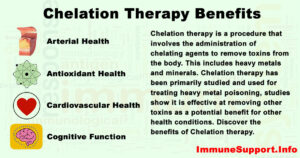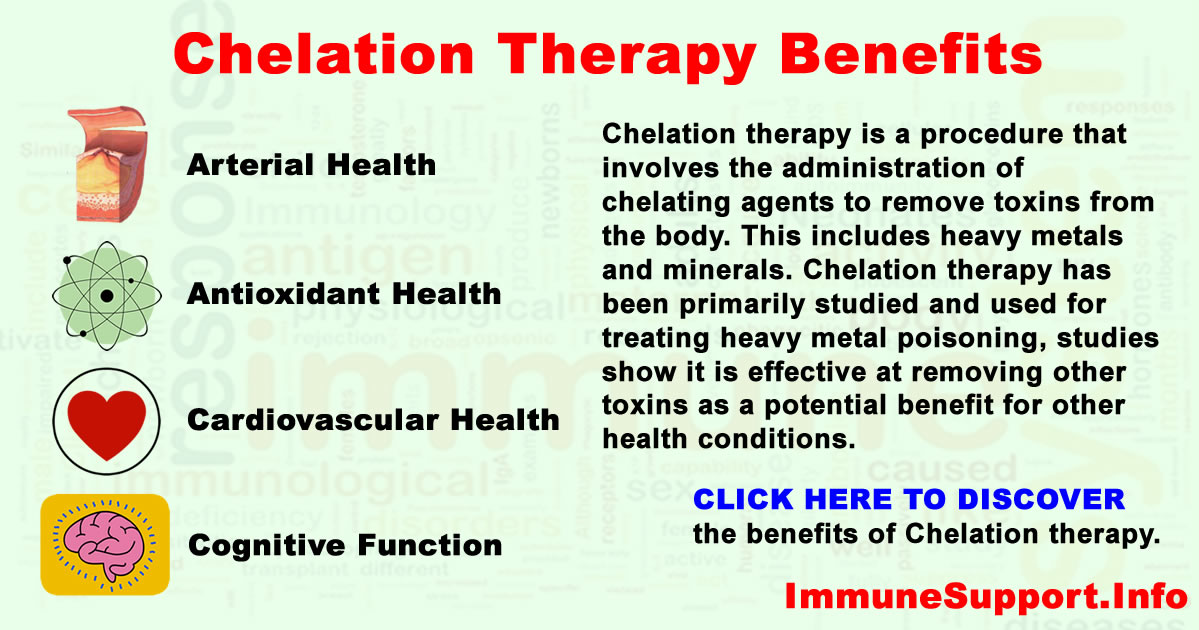Chelation Therapy Benefits
 Heavy Metal Removal:
Heavy Metal Removal:
- Chelation therapy involves the administration of chelating agents, substances that can bind to heavy metals in the body. This process is used in medical settings, primarily for treating heavy metal poisoning, such as lead or mercury toxicity[i].
- Cardiovascular Health:
- Chelation therapy has been investigated for its potential cardiovascular benefits. Some studies suggest that chelation may reduce arterial plaque and improve blood flow, although the evidence is not conclusive. 18% reduced risk of subsequent cardiac events such as heart attack, stroke, hospitalization for angina, or coronary revascularization[ii].
- Atherosclerosis Health:
- There is limited evidence suggesting that chelation therapy might have a positive impact on reducing arterial plaque and improving blood flow. This potential benefit is still an area of ongoing research and debate within the medical community[iii].
- Neurological Health:
- Some research has explored the use of chelation therapy in neurological disorders, particularly in relation to heavy metal exposure[iv]. However, more studies are needed to establish its efficacy and safety in these contexts.
- Reducing Free Radicals:
Considerations and Caution:
- Regulation and Safety:
- Chelation therapy, when performed propelry, is generally considered safe for specific conditions.
- Individual Responses:
- Responses to both zeolite supplements and chelation therapy can vary among individuals. Researching the subject and/or consulting with a healthcare professional is crucial to assess the individual’s health needs.
In conclusion, zeolites and chelation therapy have been shown to provide benefits concerning detoxification from heavy metals, however individuals should engage in their own research and/or consult a professional prior to application.
Citations
[i] Flora SJ, Pachauri V. Chelation in metal intoxication. Int J Environ Res Public Health. 2010 Jul;7(7):2745-88. doi: 10.3390/ijerph7072745. Epub 2010 Jun 28. PMID: 20717537; PMCID: PMC2922724.
[ii] Escolar E, Lamas GA, Mark DB, Boineau R, Goertz C, Rosenberg Y, Nahin RL, Ouyang P, Rozema T, Magaziner A, Nahas R, Lewis EF, Lindblad L, Lee KL. The effect of an EDTA-based chelation regimen on patients with diabetes mellitus and prior myocardial infarction in the Trial to Assess Chelation Therapy (TACT). Circ Cardiovasc Qual Outcomes. 2014 Jan;7(1):15-24. doi: 10.1161/CIRCOUTCOMES.113.000663. Epub 2013 Nov 19. PMID: 24254885; PMCID: PMC4111470.
[iii] Villarruz-Sulit MV, Forster R, Dans AL, Tan FN, Sulit DV. Chelation therapy for atherosclerotic cardiovascular disease. Cochrane Database Syst Rev. 2020 May 5;5(5):CD002785. doi: 10.1002/14651858.CD002785.pub2. PMID: 32367513; PMCID: PMC7198985.
[iv] Fulgenzi A, Ferrero ME. EDTA Chelation Therapy for the Treatment of Neurotoxicity. Int J Mol Sci. 2019 Feb 26;20(5):1019. doi: 10.3390/ijms20051019. PMID: 30813622; PMCID: PMC6429616.
[v] Sears ME. Chelation: harnessing and enhancing heavy metal detoxification–a review. ScientificWorldJournal. 2013 Apr 18;2013:219840. doi: 10.1155/2013/219840. PMID: 23690738; PMCID: PMC3654245.
[vi] Vezzoli A, Mrakic-Sposta S, Dellanoce C, Montorsi M, Vietti D, Ferrero ME. Chelation Therapy Associated with Antioxidant Supplementation Can Decrease Oxidative Stress and Inflammation in Multiple Sclerosis: Preliminary Results. Antioxidants (Basel). 2023 Jun 24;12(7):1338. doi: 10.3390/antiox12071338. PMID: 37507878; PMCID: PMC10376540.
[vii] Timoshnikov VA, Selyutina OY, Polyakov NE, Didichenko V, Kontoghiorghes GJ. Mechanistic Insights of Chelator Complexes with Essential Transition Metals: Antioxidant/Pro-Oxidant Activity and Applications in Medicine. Int J Mol Sci. 2022 Jan 23;23(3):1247. doi: 10.3390/ijms23031247. PMID: 35163169; PMCID: PMC8835618.

